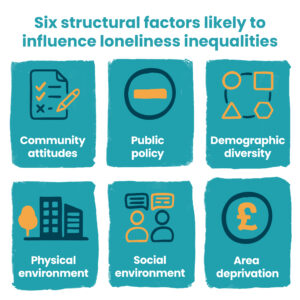A new review published by the Wales Centre for Public Policy (WCPP) brings together international evidence showing that loneliness affects the most disadvantaged groups of society more than others, and that to tackle loneliness we must combat discrimination and social exclusion, and reduce inequality.
Authored by some of the UK’s leading scholars of loneliness – Professor Manuela Barreto, Professor Pam Qualter and Dr David Doyle – the review outlines the relationship between forms of inequality and loneliness, and provides a compelling case to end loneliness by focusing on the role that people, policy and public services play in making our societies and communities more inclusive and equal. Dr Hannah Durrant, Wales Centre for Public Policy, explains more.
Who is lonely and why?
The review presents evidence for inequalities in loneliness across a range of marginalised groups, including migrants, members of ethnic and racially minoritised groups, lesbian, gay, bisexual, transgender and gender non-conforming people, disabled people, those in poor physical or mental health, carers, people living in poverty, and unemployed people. For those with multiple, intersecting, and socially stigmatised identities (e.g., older migrants in poor health), the likelihood of experiencing loneliness is even greater.
These findings echo previous WCPP research on who is lonely in Wales and evidence assembled by the Campaign to End Loneliness, which shows that those who face multiple forms of disadvantage are most likely to be lonely, a point emphasised by the British Red Cross in their recent Call to Action to tackle loneliness.
The review demonstrates the pathways from marginalisation, through everyday experiences of difference from dominant society and exclusion due to prejudice and discrimination, to loneliness.

It also identifies six structural factors that increase loneliness inequalities: community attitudes, public policies, demographic diversity, the physical environment, the social environment, and area deprivation.
What different approaches should we adopt?
Understanding loneliness through the lens of interpersonal and structural inequality shines a very different light on what we do about it.
Despite compelling evidence that loneliness is linked to discrimination, social exclusion and the harmful effects of structural factors, mainstream approaches to tackling loneliness tend to treat it as a personal problem – caused by poor social skills, depressed mood, or lack of social engagement – and provide individual-level solutions – such as befriending services or cognitive behavioural therapy. While these types of intervention may have their place, an individualised approach to loneliness risks diverting attention away from addressing the societal and structural issues causing loneliness inequalities.
We all have a responsibility to behave in ways which contribute to the fair, friendly and inclusive societies we want to live in, and policy and public services have a role in encouraging and creating the conditions for such societies to flourish.
Structural factors are very powerful in their effects on loneliness, but the good news is they are also very amenable to intervention. For example: the provision of identity safe-spaces such as LGBTQ+ venues; anti-discrimination and equalities legislation; organisational policies to encourage positive diversity climates in schools, work-places, hospitals and health centres, and community facilities; accessible and affordable transport; effective community planning, co-housing design, and green space; and by tackling the causes and consequences of poverty. Structural factors contributing to loneliness can and must be changed to address loneliness and social inequalities. This is not just about investing in infrastructure and services and developing equalities and diversity policies, but also about implementing them effectively and monitoring their implementation.
This review provides a starting point for discussions on tackling loneliness through policy and inclusive public and community services that seek to address social and structural inequalities.
At WCPP, we are planning a series of workshops to delve further into the findings of this groundbreaking review, hear additional perspectives on the nature and causes of loneliness inequalities, discuss and explore their implications, and identify what policy and practice changes are needed to tackle loneliness inequalities.
Read the Loneliness Inequalities Evidence Review.
If you are interested in finding out more about this series, or want to get involved, we’d love to hear from you – email info@wcpp.org.uk
Dr Hannah Durrant is Senior Research Fellow at the Wales Centre for Public Policy. She leads a programme of research and knowledge mobilisation on loneliness and community wellbeing.





No comments on this article yet. Please feel free to submit a comment below.
By submitting a comment you grant Campaign to End Loneliness a perpetual license to reproduce your words and name/web site in attribution. Inappropriate and irrelevant comments will be removed at an admin's discretion. Your email is used for verification purposes only, it will never be shared.